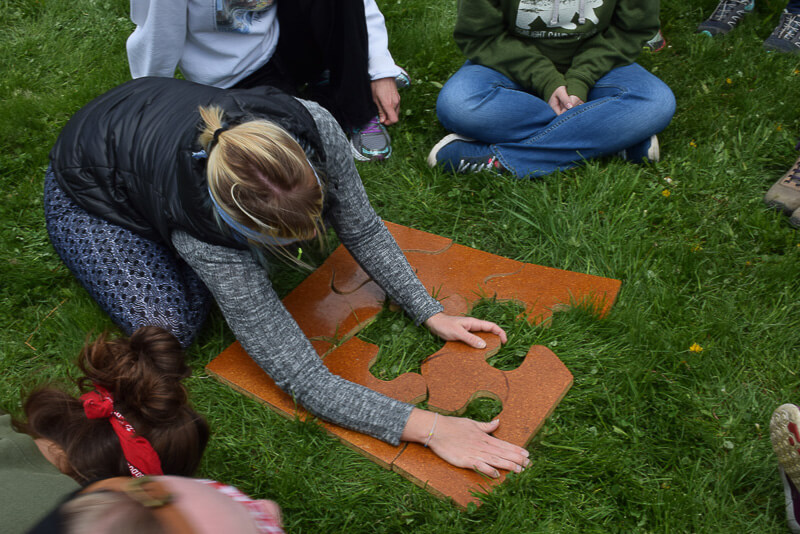“Every little puzzle piece of reality fits together in him”
Every Little Thing
Now after they had left, an angel of the Lord appeared to Joseph in a dream and said, “Get up, take the child and his mother, and flee to Egypt, and remain there until I tell you; for Herod is about to search for the child, to destroy him.” Then Joseph got up, took the child and his mother by night, and went to Egypt, and remained there until the death of Herod. This was to fulfill what had been spoken by the Lord through the prophet, “Out of Egypt I have called my son.”
When Herod saw that he had been tricked by the wise men, he was infuriated, and he sent and killed all the children in and around Bethlehem who were two years old or under, according to the time that he had learned from the wise men. Then was fulfilled what had been spoken through the prophet Jeremiah:
“A voice was heard in Ramah, wailing and loud lamentation,
Rachel weeping for her children; she refused to be consoled, because they are no more.”
When Herod died, an angel of the Lord suddenly appeared in a dream to Joseph in Egypt and said, “Get up, take the child and his mother, and go to the land of Israel, for those who were seeking the child’s life are dead.” Then Joseph got up, took the child and his mother, and went to the land of Israel. But when he heard that Archelaus was ruling over Judea in place of his father Herod, he was afraid to go there. And after being warned in a dream, he went away to the district of Galilee. There he made his home in a town called Nazareth, so that what had been spoken through the prophets might be fulfilled, “He will be called a Nazorean.”
~ the Gospel According to Matthew, Chapter 2, verses 13-23, from The Holy Bible: New Revised Standard Version. 1989, Nashville: Thomas Nelson Publishers. (Revised Common Lectionary, Year A: First Sunday After Christmas, 1 January 2017)
The prophetic words, “Out of Egypt I have called my son,” come from the prophet Hosea (11:1), and in that place the words clearly refer to God’s people, Israel, and not a future person. So Matthew freely pulls one phrase out of context because it lends import to a part of Jesus’ story.
Christians do this with some regularity. Take, for instance, the often-quoted Jeremiah 29:11: “For surely I know the plans I have for you, says the Lord, plans for your welfare and not for harm, to give you a future with hope.” It is meant to be a word of encouragement, to say that good things are just around the corner. But read verses 10-14 in their entirety, and we discover that this is not the kind of prophecy I want given to me. (Go read it, then come on back.)
Hosea’s prophecy for God’s people is difficult, but Matthew picks up one little phrase and uses it to confirm the person and message of Jesus. He does something similar with the title in verse 23—“Nazorean”—and that doesn’t even come from any book in the recognized Old Testament. Matthew is pulling any word he can from accepted important writings to bolster the story of Jesus.
Ultimately, for Matthew—and I would say for all Christians—this practice makes sense because everything points to Jesus Christ. When the gospel writers encountered Jesus, and especially when they encountered the crucified and risen Jesus, they discovered that every little puzzle piece of reality fits together in him.
Christians discover, as they look back over their lives, that “all things work together for the good of those who love God, and who are called according to God’s purpose” (Romans 8:28). Why did I have to sit through Mrs. Buzzard’s exacting high school chemistry class? Because now, twenty-some years later, my work suddenly requires me to hack through some chemical analysis. I frame my past experience by present blessing. Why did God expose me to traditional Lutheran faith in my youth, while giving me friends who introduced me to edgy rock music? Because I would be called to span a gap between styles of music in the Church’s worship. What were originally disconnected episodes have become part of a bigger, more beautiful narrative: God’s redemption in my life.
Matthew discovered that every part of Israel’s ancient story pointed to the coming of Jesus. What parts of your past, minor or misplaced notes at the time, now fit into a grander picture? What rabbit-trails in our journey actually point directly toward our destiny?
God Who Guides the Wanderer, reveal to us how all of human history points to the redemption of Jesus Christ. And as we celebrate the Word taking on flesh, show us how your love enters our flesh, and joins with our lives. Make every moment, every memory, every relationship sing with the power of your life in us. Make it so, by the power of your Holy Spirit!
~ emrys tyler

